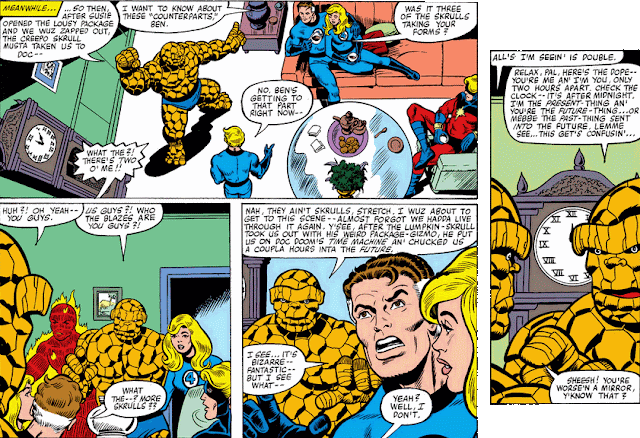Written by Doug Moench, the story for the 1980 Fantastic Four Annual would have taken place sometime during the eleven-issue run of Moench and Bill Sienkiewicz on the main title. Like Sienkiewicz, the annual's artist, George Pérez, would restrict his work to breakdowns for the issue's finishers (in this case, Chic Stone, Jon D'Agostino and Mike Esposito), which gives us some idea of the time-sensitive nature of the creative process on Fantastic Four during this period; indeed, other pencillers on the book such as Keith Pollard, John and Sal Buscema, and Pérez himself (around the fall of '77 until his departure) often did the same. Those who minded the store on inks, taking the layouts they'd been given and subsequently bringing an issue's story to life, weren't responsible for setting the direction or pacing of that story, but for much of Marvel's Bronze Age they contributed a great deal every month to finish the job the layout artist began and meet those deadlines--and, of course, the benefit to the pencil work that greets our eyes is obvious.
Pérez returns to our foursome here after turning in full pencils for the prior year's annual (collaborating with writer Marv Wolfman), the two annuals comprising his final work with the characters following his brief return to The Avengers earlier in the year and, from there, transitioning to DC Comics. As for the annual's contents, which include a backup feature that details the return of Dr. Doom from the fate he met in the FF's 200th anniversary issue, the page count for this annual's FF story tops out at twenty-four--and so the threat the FF and guest-star Captain Marvel face from a "Prime" assault of ten Skrulls may come off as being wrapped up fairly quickly for the primary story of an annual.
Its premise: Reed Richards invents a wireless "gateway" transmitter of energy across virtually any distance which can send power to receiving cells placed in (for example) vehicles, negating the need for batteries. But unknown to Reed, his research parallels the work of Skrull scientists seeking to create a matter transmitter to use as a weapon against their enemies, the Kree--something that the Skrulls learn when Reed's device forms an accidental link between both gateway terminals. The Skrulls come to realize that Reed's successful gateway can be adapted for their use--and so it isn't long before we find a Skrull agent, after disguising himself to get the drop on Reed's three partners, confronting Reed and delivering his demands.
Fortunately for Reed, Captain Marvel arrives to help deal with the Skrull threat--but this development isn't all that it seems, as Reed learns while he listens to the words of his "rescuer."
The Skrull's ruse exposed, Reed and Mar-vell have a minute to touch base on what's been happening here; but outside, Mar-vell's strike* has roused the attention of others on the street who apparently have a stake in this operation--and once they arrive, the so-called Prime Ten assemble to complete their mission.
*It's news to me that Mar-vell can wield cosmic power along with his cosmic awareness, Mr. Moench. And ordinary Earth foes still presented a challenge to him?
With all of the FF as well as Captain Marvel in the fight, the Prime Ten are dealt with and returned via Reed's gateway to its counterpart in the Skrull galaxy. Yet in doing so, Reed is forced to make a difficult choice which will obliterate the hopes he had for this project--while during the fray, he also has cause to mull over the curious words of his teammates as to where they've been, and who they've been conversing with.
With the dust settling, the mystery of the three FF members' whereabouts is resolved, as it becomes clear just how the first Skrull "disposed" of his three victims--an act, as it turned out, which led to the defeat of himself and the rest of the Prime Ten.
Paired with the Doom story, "Time for the Prime Ten" makes for a decent enough FF annual tale--or a Marvel Team-Up story featuring Mr. Fantastic and Captain Marvel, take your pick. And thanks to that colossal cover banner, there also happened to be a perk to picking up this issue:















In the UK an annual is a hardback book often given as a Christmas present so annuals go on sale in the final months of the year and are dated for the following year. Marvel UK too stuck to this established tradition so, for example, "Spider-Man Annual 1976" went on sale around October 1975 and was available both in shops and via mail-order from Marvel.
ReplyDeleteI bought US Marvel comics with "Win A Toys R Us Shopping Spree" emblazoned on them but at the time I'd never heard of Toys R Us because they were unknown in Britain (well, unknown where I lived anyway).
ReplyDeleteFrom what I understand, Colin, Toys R Us went belly-up around 2017 and finally closed its remaining stores last year. Apparently they've taken another crack at it this year, this time by opening shops within Macy's stores nationwide. I haven't seen any Marvel cover banner promotions for some time, but I can only wonder if they've been approached, given how hot their cinematic projects are these days.
ReplyDeleteNever liked Toys-R-Us. Maybe I'm just from that generation where toy shops were tiny little family-run places tha5 you could slowly browse around, never knowing what you'd find. Toys-R-Us was an absolute monstrosity in comparison. Huge warehouses with primary colours all over the place and row after row of shelves stacked to the ceiling. They would turn kids into unbearable screaming monsters the same way an overdose of Haribo would.
ReplyDeleteDepartment stores usually have a good stock of toys, as well (I guess Macy's and Toys R Us would be a good fit, then)--but also specialty stores, e.g. Lego stores or age-specific shops.
ReplyDelete